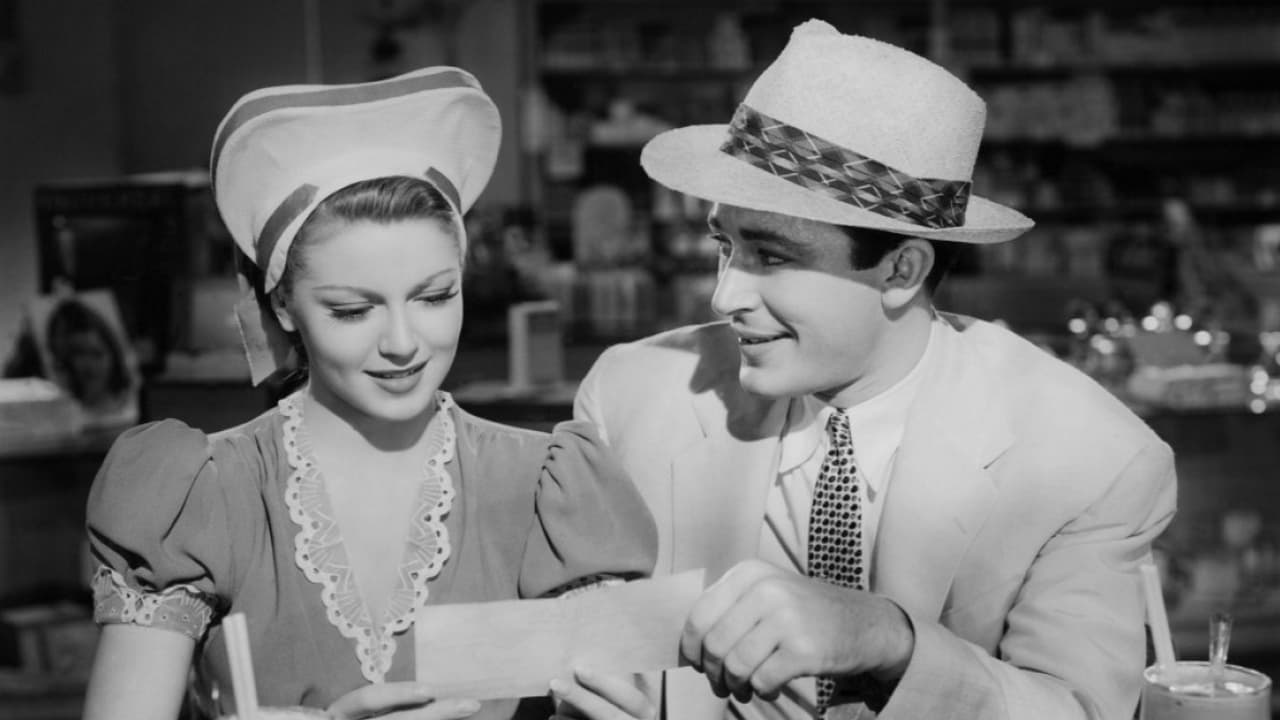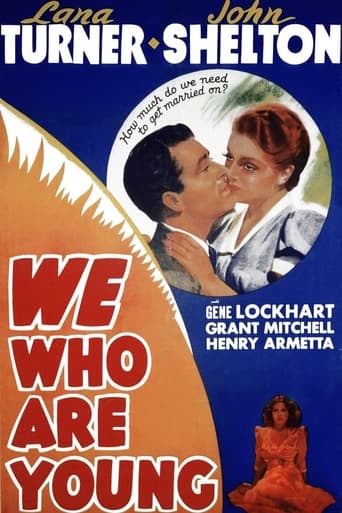Beystiman
It's fun, it's light, [but] it has a hard time when its tries to get heavy.
filippaberry84
I think this is a new genre that they're all sort of working their way through it and haven't got all the kinks worked out yet but it's a genre that works for me.
Bob
This is one of the best movies I’ve seen in a very long time. You have to go and see this on the big screen.
bkoganbing
The 'young' in the title of this film are a newlywed couple played by the rising Lana Turner and leveling John Shelton. We Who Are Young tells of the trials and
travails of young married folk during the 30s.Both are working until Turner takes maternity leave. Shelton who has been raised
in a strong work ethic home is being driven slowly crazy by the enforced idleness
as he seeks employment in an uncaring world.It's hard to explain, but during the Depression years unemployment rose to almost a quarter of the population. If you were raised in a strong work ethic
home getting a relief check (welfare in these days) was an act stripping the
male of his manhood. That is conveyed quite well by Shelton and Turner is
wonderful as the supportive wife and soon to be mother.I would compare this film to the James Stewart/Carole Lombard classic Made
For Each Other. Made For Each Other is better but it covers a lot of the same
ground that We Who Are Young Does.Lana Turner's fans will approve.
calvinnme
Directed by Harold S. Bucquet, usually working on sentimental films at MGM, and this is one of those films.A pig headed by the book executive, C.B. Beamis (Gene Lockhart),has a rule that none of the employees can be married to one another. So when Margy (Lana Turner) and William (John Shelton) fall in love and marry and Beamis finds out, he fires them both.Soon they are expecting their first child, but William cannot get work anywhere. Instead he depends on relief. Three months into being on the dole he just picks up a shovel and starts digging. When the digging crew protests and the boss man protests, William just says that he is tired of feeling useless, just being fed and housed by the government and not part of society. He's so sick he'll work for free. The boss man gets a policeman and William is in jail for criminal trespass and a bunch of other minor charges, but still he is separated from his extremely pregnant wife who has no idea where he is.Will this all work out? Of course it will! It's a Harold Bucquet film in the MGM tradition! Watch and find out how.Lockhart is great as the pig headed irascible boss, John Shelton is good as the optimistic guy who quickly loses that optimism, and Lana Turner is almost too sweet and understanding as the wife. I can say that the film was not exactly timely. By 1940 the Great Depression was pretty much over and this might have packed a more meaningful punch had it come out about three years before. Its message about cooperation, basically "It Takes A Village 1940 Style" was rather timely considering WWII was just a year away.
kidboots
...Famous fighting words uttered by Bill Brooks as he and his cute wife Marjorie (Lana Turner) look over the skyline. And in this sudsy MGM melodrama it seems a forgone conclusion as battling Bill crosses swords with meanie boss Mr. Beamis (Gene Lockhart), then later on with a meanie hire purchase employer. Lana Turner goes through the movie with a "smiling through tears" look on her face - her emotions never vary as she supports Bill through thick and thin. She and Bill are secretly married, it is against company policy for staff to be married and the day they have a glorious lunch hour picking furniture for their little flat, on the installment plan - you guessed it, by the day's end Marjorie is out of a job.Hardship follows hardship - Bill takes out a loan so Marjorie can have her own doctor when the baby's due, falls behind in his payments and he, too, is fired by Mr. Beamis, who sends him on his way with an assortment of homilies about scrimping and saving and keeping your nose to the grindstone etc. Cheery Marjorie hocks her wedding ring to pay for Bill to do a chartered accounting course but still no job and, desperate, he rushes out into the night, claiming he would rather steal than go on relief. Don't let "Screenplay by Dalton Trumbo" fool you, this is just another MGM fairy story about two kids trying to make it in the big city. It was done so much better in "Bad Girl" (1931) with Sally Eilers and James Dunn making you believe in their gritty portraits of love on the dole and just as realistic, "I Promise to Pay" about the sometimes grim reality of the dreaded installment plan. Trumbo's stamp is put on it by a couple of speeches - Bill, desperate, tries to get work on a construction site and Jonathon Hale gives him a job, first telling him that he was exactly in Bill's position as a young married man, Bill, in turn, proceeds to give Mr. Beamish a tongue lashing to the effect that people should be kinder to each other!!!Of course with a lot of MGM movies of the 1940s, everything had to be patched up and tied with a nice ribbon. Mr. Beamish proves to be not such a meanie after all and the end shows Bill in the hospital, beaming at Marjorie, who has presented him with twins (she looks and sounds as though she doesn't know how it all happened - maybe the twins were a surprise edition to the script) and is now able to chose between two jobs.Lana Turner as a young destitute married girl trying to give support to her struggling husband, was one movie role that she didn't have to become accustomed to. She always looked as though she was born to wear diamonds and furs but she had first hand experience, as a child, of poverty and family instability. She was enchanted by her father's shiftless personality but it didn't make for a happy home life and one night after taking part in a crap game he was found dead in a nearby town. The poverty didn't end for Lana until she was discovered by a talent scout in an ice cream parlour after cutting class.
curtis martin
"We Who Are Young" is the odd kind of movie that David Lynch, the Cohen Brothers, and Ed Wood Jr. must have adored as young men. It's an odd, stilted bit of didactic goofiness about how tough it is to get ahead in a stifling capitalistic society. It follows a young couple, a pre-stardom Lana Turner and John Shelton, as they invariably make the wrong financial moves during the pre-WW II Depression era. They both work at the same office-an accounting firm run like a factory, lunch-period buzzers and all-until it is discovered that they are married. No married women are allowed by company policy, and she is fired (but not before receiving lots of stern advice on living within one's means by the robotic department manager). And this happens just after they buy over $200 worth of new furniture on his $25 a week salary, now their only income. Then she gets pregnant. Then HE gets fired (and has an absolutely histrionic girly-fit, yelling at his boss that `if this affects my wife or child in any way, I'll come back here and just kill you! I'll just kill you!'). And it goes on. What makes the film so special, besides the unintentionally hilarious dialogue, is the way the actors will periodically stare into space as we hear their poetic thoughts overdubbed-very, VERY Ed Wood (and not unlike the similarly awkward thought-balloon overdubbing in Lynch's version of `Dune'). But the gooney monologues are certainly not constrained to the characters' inner world; they also take the occasion to look straight into the camera and actually speak their thoughts at length, even though other characters may be right next to them. How to react to this kind of strangeness is left entirely up to you, the viewer, because the film is so ineptly made you can have no idea whether it's trying to be serious or comedic. I don't want to spoil it for you, but let's just say that if you're a fan of the Coen Brothers' `The Hudsucker Proxy', the less violent moments of Lynch films like `Blue Velvet', Wood's `Glen or Glenda' and the like, you will enjoy seeing their genesis in this nutty bit of 1940's agitprop-pop.Look for it on AMC and Turner Classic.

